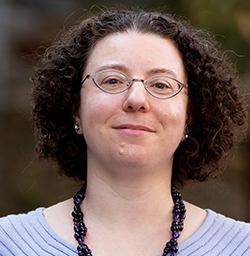Department Chair, Associate Professor

Email: lzscheifele@loyola.edu
Phone: 410-617-2316
Fax: 410-617-2057
Office
Donnelly Science 374
Department of Biology
Loyola University Maryland
4501 North Charles Street
Baltimore, MD 21210-2699
Biography
Transposons are mobile DNA sequences that replicate and insert into new locations in the genome. Despite the fact that transposons can accumulate to very high levels (in fact, they comprise ~40% of the human genome), they are frequently referred to as “junk DNA” or “selfish DNA”. However, the presence of transposons dramatically affects genome stability since they are sites at which DNA sequences can pair and exchange genetic information. In cells with many copies of these repeated sequences, the chromosomes can mispair and improperly recombine, leading to chromosome rearrangements. These structural alterations can profoundly disturb the expression of genes on the affected chromosomes; indeed aberrant chromosomes are frequently present in cancerous cells. The tranposons that I study are the Ty1 elements of yeast, which are frequently associated with sites of chromosomal duplications, deletions and translocations. Yet, the overall incidence of these chromosome changes is rare, suggesting that the cell contains a mechanism to restrain improper pairing and recombination of DNA between the dispersed repeats. To identify those cellular factors that prevent tranposons from causing improper rearrangement of DNA, we use genetic screens. We hope to identify genes that, when deleted, increase the number of chromosome rearrangements in yeast strains with high numbers of transposons. These studies should provide important insights on how chromosome aberrations are prevented so that genetic information can be faithfully transmitted. In addition, we are studying whether chromosomal changes produced by transposon sequences can be advantageous to the cell by enabling evolution. We use a continuous culture system to evolve yeast strains in which we have manipulated the number and position of transposon sequences in the genome. Following experimental evolution, we use genomic technologies to measure fitness and monitor chromosome structure in the evolved strains so that we may learn whether repeated sequences provide a source of genetic variation that promotes genome evolution.
Publications
- Scheifele LZ and Burkett T. (2016). Three Years of a Community Laboratory: Lessons Learned and Ways Forward. J. Microbiol. Biol. Educ. 17(1): 81-85. [Perspectives].
- Annaluru N, Muller H, Mitchell LA, Ramalingam S, Stracquadanio G, Richardson SM, Dymond JS, Scheifele LZ, Cooper EM, Cai Y, Zeller K, et al. (2014) Total Synthesis of a Functional Designer Eukaryotic Chromosome. Science. 344(6179):55-8.
- Thompson, CR, Brogan, RS, Scheifele, LZ, Rivers, DB. (2013). Bacterial Interactions with
Necrophagous Flies. Ann Entomol Soc Am, 106(6): 799-809. [Review].
- Scheifele, LZ. (2013) Genomics Gets Personal. J Microbiol. Biol. Educ. 14(1):136. [Review].
- Scheifele LZ. (2010) Building microbial machines. J Microbiol. Bio.l Educ.11(2): 187. [Review].
- Lee PA, Dymond JS, Scheifele LZ, Richardson SM, Foelber K, Boeke JD and Bader, JS. (2010). Clone QC: lightweight sequence verification for synthetic biology. Nucleic Acids Res. 38(8): 2617-23.
Area of Specialization
- Molecular Biology and Genomics